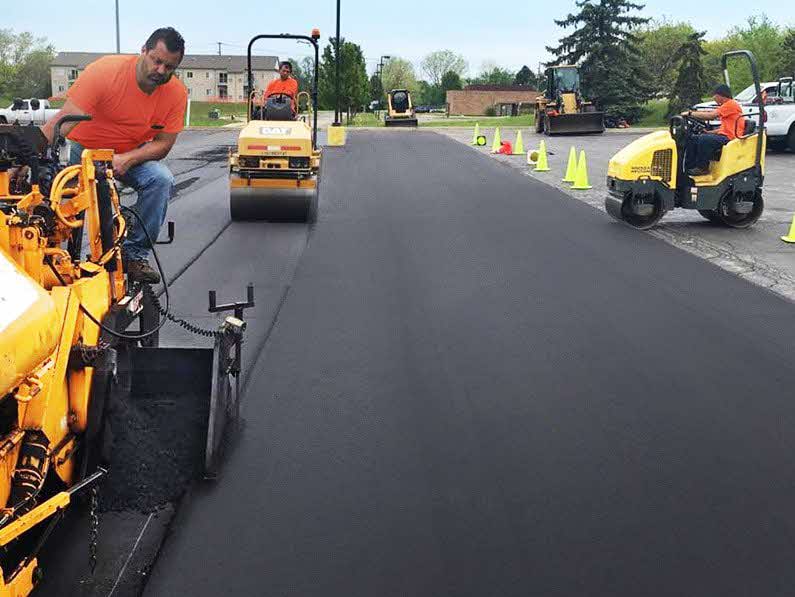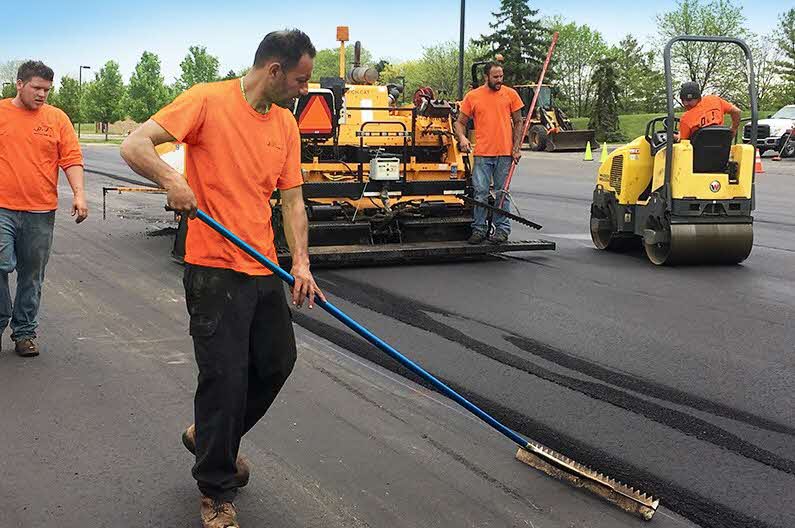Chip Sealing Broad Acres Michigan
We Are Locally Owned
& Operated For 36 Years
About Chip Sealing
Introduction to Chip Sealing
When it comes to commercial properties, maintenance and aesthetics play a crucial role. One aspect that can significantly impact both these facets is driveway paving. A particular paving method that has proven cost-effective and reliable over the years is ‘Chip Sealing’. Characterized by its durability and visual appeal, chip sealing is a widely adopted solution for large scale properties such as commercial complexes, shopping centers, industrial estates, and more.
Understanding Chip Sealing
The process of chip sealing, also known as tar and chip driveway, involves the application of a hot mix of liquid asphalt and small chips or stones on the surface. The chip seal driveway provides a robust layer of protection against the wear and tear induced by heavy traffic, extreme weather, and other deteriorating factors. In essence, chip sealing offers a perfect balance between cost, appearance, and durability, making it an attractive choice for commercial property owners and managers.
The Process of Chip Seal Driveway Installation
Creating a chip and seal driveway begins with a careful preparation of the base surface, whether it’s a parking lot, a walkway, or a long driveway. Once this base has been sufficiently cleaned and leveled, a sealer of hot liquid asphalt is sprayed onto it. Immediately after this, a layer of aggregate chips is spread and then compacted onto the asphalt layer. The chips are embedded into the asphalt, crafting a hard, sturdy surface upon cooling and setting. The whole process is carried out meticulously by professional tar & chip driveway contractors who are well-versed with the subtleties of this paving method.
Benefits of Chip Seal Paving
As a commercial property owner, when you opt for chip seal paving, you stand to gain several benefits. Firstly, chip and seal paving provides a natural and rustic appearance that adds to the overall aesthetic appeal of your property. The gravel-like texture offers excellent traction, reducing the risk of accidents in inclement weather. With plenty of customization options available in terms of stone type and color, you can match the chip and seal driveway with your building’s façade or the landscape around it.
Secondly, chip sealing is more cost-effective compared to traditional asphalt or concrete paving methods. For a fraction of the cost, chip sealing offers a lasting solution that requires lesser maintenance and repairs. Moreover, due to its ability to absorb and dissipate heat, a chip sealed surface is less prone to cracks caused by heat expansion.
Choosing the Right Contractors
Choosing the right tar & chip driveway contractors is vital to ensure a successful chip sealing project. Professional contractors, with their widespread knowledge and hands-on experience, can handle tasks ranging from the basic site assessment to the final finish with utmost precision and care. They can guide you through the entire process, making it hassle-free and smooth.
Opting for Chip Sealing – A Sum up
To sum up, whether you have a large commercial property or are a community looking for a cost-effective walkway, chip sealing is an excellent choice to consider. Its durability, cost-efficiency, and visual appeal make it a highly recommended option for commercial driveway applications. Remember, successful chip sealing is a combination of the right materials, correct application, and trusted contractors.
Conclusion
Ensuring longevity and durability while reducing maintenance cost in commercial properties isn’t a small feat. However, with chip sealing, these goals are conveniently achievable. From providing a sturdy surface that withstands rigorous usage and harsh weather to ensuring a pleasing aesthetic that adds to the property’s value, chip sealing caters to every need. Moreover, with the diversity of colors and materials available, you can customize the chip sealed surfaces to complement the surroundings harmoniously. For a perfect blend of functionality and beauty, entrust your paving needs with chip sealing and witness the transformation that it brings to your commercial property.
Take Action Now!
If you’re ready to make an informed decision about the chip sealing of your commercial property or need further assistance, don’t hesitate to contact your trusted local chip sealing professionals. They are ready to guide you through the process, answer all your questions, and provide a free estimate for your project. Don’t wait—get in touch today!
Contact Us Today for a FREE
Chip Seal Quote






About Broad Acres, Michigan
History
The first settlement on the land that is now Clinton Township was called Gnadenhuetten and was established in 1782 by Rev. David Zeisberg, but closed in 1786. It was organized as “Huron Township” on August 12, 1818, named after what was then known as the Huron River. Because of confusion with another Huron River south of Detroit, on July 17, 1824, the Michigan Territorial Legislature renamed both the township and the river after DeWitt Clinton, the popular governor of New York from 1817 to 1823 who was largely responsible for building the Erie Canal which enabled many settlers to come to Michigan.
Moravian Drive is the township’s oldest road, dating back to the days when Moravian missionaries settled to attempt to convert the local Native Americans.
Geography
Clinton Township is in south-central Macomb County. The city of Mount Clemens, the Macomb county seat, is bordered on three sides by the northeast part of the township.
According to the United States Census Bureau, Clinton Township has a total area of 28.37 square miles (73.5 km), of which 28.03 square miles (72.6 km2) are land and 0.35 square miles (0.91 km), or 1.22%, are water. The Clinton River, for which the community is named, is formed from three branches within the township. It runs east into Harrison Township, where it flows into Lake St. Clair. The township is home to many parks, notably George George Memorial Park.
Communities
There are two unincorporated communities in the township:
- Broad Acres is located in the southeastern portion on M-3/Gratiot Avenue between 15 Mile and Quinn Roads (42°32′57″N 82°54′08″W / 42.54917°N 82.90222°W; Elevation: 610 ft./186 m.).
- Cady is located in the southwestern portion at Utica and Moravian Roads (42°33′37″N 82°57′52″W / 42.56028°N 82.96444°W; Elevation: 614 ft./187 m.). It was founded in 1833 by Chauncey G. Cady. Cady served for a time as township supervisor and was also a member of the state legislature. It had a post office from 1864 until 1906.
Demographics
| Census | Pop. | Note | %± |
|---|---|---|---|
| 2000 | 95,648 | — | |
| 2010 | 96,796 | 1.2% | |
| 2020 | 100,513 | 3.8% | |
| U.S. Decennial Census | |||
2020
| Race / Ethnicity (NH = Non-Hispanic) | Pop 2000 | Pop 2010 | Pop 2020 | % 2000 | % 2010 | % 2020 |
|---|---|---|---|---|---|---|
| White alone (NH) | 86,042 | 78,062 | 72,926 | 89.96% | 80.65% | 72.55% |
| Black or African American alone (NH) | 4,424 | 12,509 | 17,428 | 4.63% | 12.92% | 17.34% |
| Native American or Alaska Native alone (NH) | 223 | 230 | 192 | 0.23% | 0.24% | 0.19% |
| Asian alone (NH) | 1,597 | 1,723 | 2,170 | 1.67% | 1.78% | 2.16% |
| Pacific Islander alone (NH) | 11 | 29 | 19 | 0.01% | 0.03% | 0.02% |
| Other race alone (NH) | 82 | 82 | 335 | 0.09% | 0.08% | 0.33% |
| Mixed race or Multiracial (NH) | 1,605 | 1,871 | 4,449 | 1.68% | 1.93% | 4.43% |
| Hispanic or Latino (any race) | 1,664 | 2,290 | 2,994 | 1.74% | 2.37% | 2.98% |
| Total | 95,648 | 96,796 | 100,513 | 100.00% | 100.00% | 100.00% |
2010
As of the census of 2010, there were 96,796 people, 42,036 households, and 25,678 families residing in the township. The racial makeup of the township was 82.08% White, 13.04% African American, 0.28% Native American, 1.79% Asian, 0.03% Pacific Islander, 0.61% from other races, and 2.17% from two or more races. Hispanic or Latino people of any race were 2.37% of the population. By 2016, the township’s population was estimated to have surpassed 100,000.
In 2000, there were 40,299 households, out of which 28.1% had children under the age of 18 living with them, 48.7% were married couples living together, 10.9% had a female householder with no husband present, and 36.6% were non-families. 30.8% of all households were made up of individuals, and 10.8% had someone living alone who was 65 years of age or older. The average household size was 2.35 and the average family size was 2.98.
In 2000, 22.4% of the population was under the age of 18, 9.1% from 18 to 24, 30.9% from 25 to 44, 23.4% from 45 to 64, and 14.3% who were 65 years of age or older. The median age was 37 years. For every 100 females, there were 92.4 males. For every 100 females age 18 and over, there were 88.5 males. The median income for a household in the township was $50,067, and the median income for a family was $61,497. Males had a median income of $48,818 versus $29,847 for females. The per capita income for the township was $25,758. About 4.2% of families and 5.8% of the population were below the poverty line, including 7.4% of those under age 18 and 6.8% of those age 65 or over.
Education
Chippewa Valley Schools, with two high schools (Chippewa Valley and Dakota), and Clintondale Community Schools, with one high school (Clintondale High), are the primary school districts in the township. Other school districts that operate within Clinton Township are L’Anse Creuse, Fraser, and Mount Clemens.
Contact Us Today for a FREE
Chip Seal Quote
Our Chip Seal services are available in Broad Acres as well as all of Macomb County.
Our dedicated team at D&J Contracting Inc is at-the-ready to provide you with great customer service and first class Chip Seal services. Reach out to us at (586) 954-0008 to discuss your Chip Seal needs today!